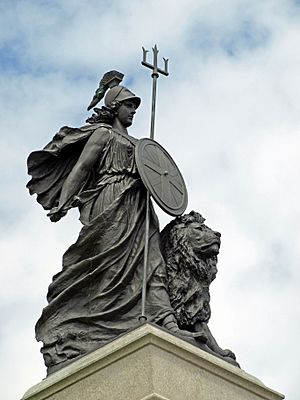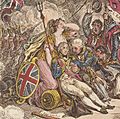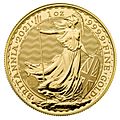Britannia facts for kids
Britannia is a special name for Great Britain. It comes from Latin, the language of the ancient Romans. When the Romans came to Britain in AD 43, they called their new province here "Britannia." This Roman area covered much of what is now England, and sometimes parts of Scotland and Wales.
Before the Romans, people speaking Celtic languages called the island "Albion." Today, "Britannia" is still used to mean Great Britain. It's also the name of a famous female figure who represents the island, like a symbol.
Contents
Britannia: A Name Through Time
The name "Britannia" has a long history. Ancient writers used different names for the island we now call Great Britain.
Early Mentions of Albion
A Roman writer named Pliny the Elder wrote about the island in his book Natural History. He said the island itself was called "Albion." He also mentioned that the islands around it were called "the Britanniae."
Another writer, Ptolemy, who lived in the 2nd Century AD, also used the name "Albion" in his book Geographia.
Kings and Their Titles
Later, English kings used these ancient names in their titles.
- In 930, King Æthelstan called himself "King and chief of the whole realm of Albion."
- His nephew, King Edgar, used the title "August emperor of all Albion" in 970.
- Alfred the Great also used a form of the word, "bryttania."
How the Name Changed
Over time, the word "Britannia" changed as languages evolved.
- In Old French, it was "Bretaigne."
- In Modern French, it became "Bretagne."
- In Middle English, it was "Bretayne" or "Breteyne."
These French words eventually replaced the older Old English words for Britain, like "Breoton" and "Breten-lond."
Related pages
Images for kids
-
Britannia mourning the death of Horatio Nelson at the victorious Battle of Trafalgar in a cartoon by James Gillray
-
1914 Russian poster depicting the Triple Entente – Britannia (right) and Marianne (left) flank Mother Russia, with Britannia's association with the sea provided by an anchor
See also
 In Spanish: Britannia (personificación) para niños
In Spanish: Britannia (personificación) para niños
 | John T. Biggers |
 | Thomas Blackshear |
 | Mark Bradford |
 | Beverly Buchanan |






